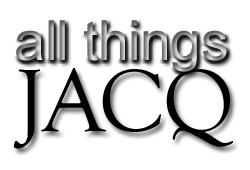


 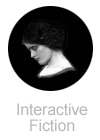
 
 
 Graphic Adventure Review:Carte Blanche(A review rated PG-13+, written with Sam Kabo Ashwell)First posted in April, 2009 Graphic Adventure Review:Carte Blanche(A review rated PG-13+, written with Sam Kabo Ashwell)First posted in April, 2009
Bless us, Gunther Schmidl, for we have sinned. It has been nearly two years since our last confession.
A couple of years ago, a, um, fan of our snarky tag team graphic adventure reviews sent us some games to review. We excitedly ripped open the package from Europe and quickly played Lemur Turtle Cheesecake V and promptly wrote a review. Then, for some reason, we let the games sit, collecting dust, for months and months. But guilt and boredom congealed in our hearts like diesel in an old pickup truck on the Yukon highway in January, and we knew we had done wrong.
We hope to make amends with this review of...
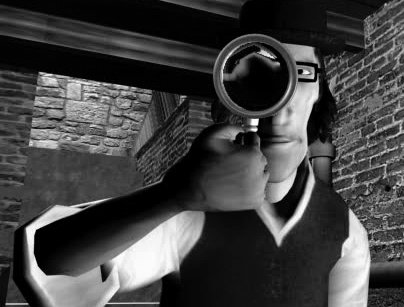 Carte Blanche, December 2006, by Absurdus Games
A mostly spoiler-free review for your enjoyment.
(Because we think you should play this game.)
(Seriously.)
Carte Blanche, December 2006, by Absurdus Games
A mostly spoiler-free review for your enjoyment.
(Because we think you should play this game.)
(Seriously.)
Sam: | Carte Blanche is a detective noir comedy from the team that brought you—or at least us—Eye of the Kraken, a game about smoking everything in sight and ahistorical cameos and astrolabes. I was sure that we'd done a review of it at some point but now we can't find it. Trust us, however: it was both awesome and, um, bemusing. |
Jacqueline: | Eye of the Kraken is one of my favorites. It's available for free and if you've never played it, you should go download it as soon as you're done reading this hopefully entertaining review.
In fact, the only reason Carte Blanche wasn't the very first game we played when this box of goodies arrived from Gunther two years ago is that we were unable to get it to run for some reason that I can't recall. All I remember was that not being able to run a game from the awesome folks at Absurdus made me very sad.
We've since built a better computer, and getting Carte Blanche to run this time was effortless. |
Sam: | As with EotK, Carte Blanche is a medium-sized graphic adventure with fairly low-end 3D graphics. |
Jacqueline: | Well now, wait a second. I wouldn't call these low-end. I mean, EotK was low-end, I'll grant you. But CB does some very cool things. It intentionally uses black and white to complement its setting in the Montreal of 1924 and has some cool cinematographic effects... |
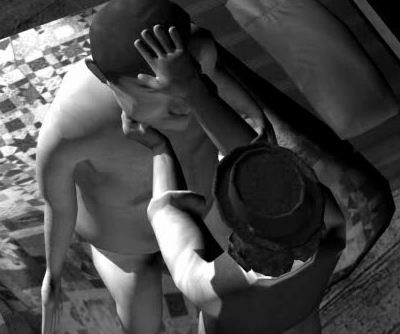
|
Jacqueline: | See? Cool camera angles and genre shadows and stuff. Though, admittedly I... um... might have picked a different screenshot to illustrate my point, especially this early in the review.
But seriously. What's odd about the graphics is that when I first watched the trailer, pre-release (years ago), I recall the graphics being a touch off-putting for whatever reason. Then when we sat down to play this last night I instead found them endearing and mood-setting and at certain times even beautiful. |
Sam: | What I was about to say before I was so rudely interrupted was that the fairly crude 3D is employed with considerable craft—the black-and-white lo-fi look alleviates the problem of unnatural textures and low detail, the heavily caricatured characters avoid the uncanny valley, and the awkward animation is made less artificial by making everyone—particularly the protagonist—rather stiff and fussy. |
Jacqueline: | So you're ... agreeing with me. And I should ... maybe not be so quick to disagree and interrupt.
Then again, I want to give the people what they paid for. Carry on, darling... |
Sam: | The designers overtly aim to produce something that looks cinematic and period-feeling, and it mostly works - except for the very restricted-feeling movement. Cinema of this period is, on the whole, still really excited about being a moving picture. |
Jacqueline: | Well, that and that movies of this period didn't touch on adult themes, such as, oh, necrophilia and body desecration, experimental drug use, and... well, I've already shown our readers that the protagonist ends up patting naked men on the head. What other adult themes can you think of, Sam? |
Sam: | Quebec? |
Jacqueline: | Oh right. That, too. |
Sam: | The smoking iguana fits right in, though. Adult themes aside, the game is self-consciously lacking in violence. There's a threatened lynching, but all the mob (three strong) does is stand around until you work out how to call them off. You learn wrestling moves that mostly involve patting people softly on the head. |
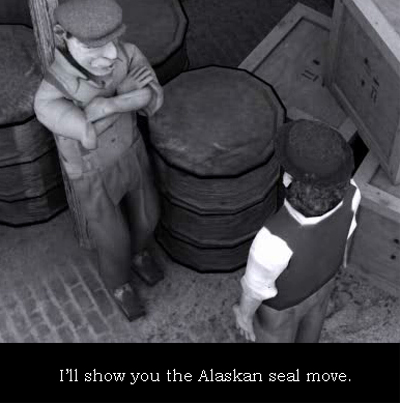
|
Jacqueline: | I must say that the game gets an extra point... perhaps even two extra points, for referencing the classic Alaskan seal move. Known throughout the Greatland as a sure-fire wrestling move guaranteed to incapacitate... well... fish. Maybe. But hey, Alaska! And then, since I'm a big bluegrass fan, they also get a point for a reference to Dueling Banjos. |
Sam: | People threaten you with death and then chat agreeably. People die, but in a campy way, without blood. Yet, well, you violently desecrate a corpse on-screen. It feels somewhat like a lampoon of Boy's Own Noir - there are points where the subtitles include swearwords but the voice-acting uses 'schnitzel' or 'klingon' (for 'shit' and 'tosser' respectively; actors going slightly off-script is a minor recurring gag.) This partly ties in to Edgar's greenhorn status, but is mostly because the game doesn't take itself very seriously.
Um. Okay. Structure. Would you like to introduce some plot or something, snugglebunches? |
Jacqueline: | Sure thing, um, toaster strudel. You play the role of Edgar Delacroix, a recent liberal arts university graduate looking for work in 1924 Montreal. You find an employment ad in the paper, phone the establishment, are invited for an interview, and are hired on the spot as an assistant to a private investigator. Despite the fact that, like any good college graduate, you know absolutely nothing and have zero experience.
Let the wacky antics ensue. |
Sam: | The game follows a pretty standard adventure-game format: wander around a map, talk to people, unlock new locations, acquire objects. |
Jacqueline: | Yeah, this was one of those games where I really felt the constraint of the graphic adventure format that can often be overcome in text-based interactive fiction. Not only do your actions trigger unrelated events and open up new areas on the map, but sometimes you weren't allowed to do really, really painfully obvious things with your inventory unless you'd been told that you could do something. This was probably meant as a plot device, as the character is learning how to be a private dick from other characters, but you don't have to be a rocket scientist to figure out that you can use the brick in your inventory to smash a padlock on a door (and that's less of a spoiler than a blessedly-deserved hint, readers).
So, like just about every good adventure game out there, CB has a lot of Figure Out What You Need to Do to Trigger the Next Bits. While it did sin greatly in this regard, it kept the good ol' Search For The Cursor Hot Spots to a minimum, and while you were forced to travel willy-nilly all over Montreal to figure out what to do next, the travel didn't seem to cost you much time (if any) and the map interface was both attractive and easy to use (especially once we figured out that that the really weird icon for our office was a poorly-rendered image of Isaac, Jeannine's iguana): |
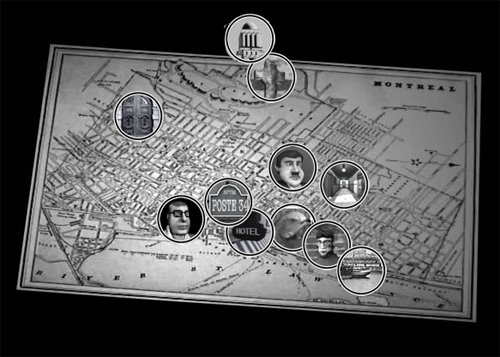
|
Sam: | A slight innovation - there's an RPG-like approach where you can be taught skills like [Scam] or [Observation], and then improve them by successful use, which is just as important as acquiring objects. In practice, however, this usually doesn't make the gameplay any more RPG-like; the skills are mechanically just stand-ins for inventory items, and your choices are limited enough that they don't really present you with alternative ways of solving puzzles. |
Jacqueline: | Hrm. True. Although part of the game's no-lose charm is that, should you attempt to scam or persuade or corrupt someone when you didn't quite have the skills to do so it generally leads to an amusing conversation. It almost makes you want to try things you're absolutely certain to fail at, just to see the results. Additionally, some of the skill concepts were amusing. |
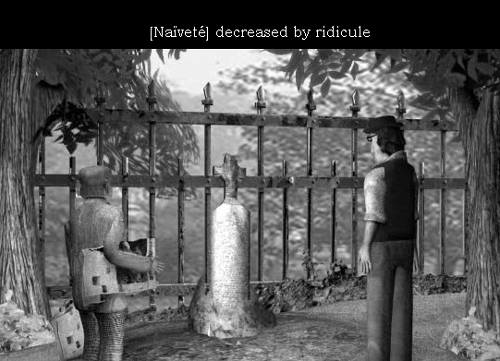
|
Sam: | Many of the skills have no mechanical function - some are just to reflect character growth (you lose Naïvité and gain Reputation over the course of the game, although these have no discernable game effect) or as gags (Sensuality, for example)— |
Jacqueline: | —and then there are some that you're certain are just gags, but then actually turn out to be critically useful. |
Sam: | In general, however, there are only a handful of times in the game where it's even possible to have too low a skill at the point that you need to use it, and many skills that you think would be highly useful only get used once. So the fusion of RPG and adventure-game styles is mostly an aesthetic one. In theory, you can export your character to use in an as-yet-unmanifested sequel, but the difference between two winning characters is unlikely to be significant. |
Jacqueline: | Yeah, the game's website tries to use the Skills feature as a selling point:
| As the episodes go by each character progresses differently, developing in accordance with the player’s style, thus making each session unique. Can you do that in the Myst series? No? Well there you go! |
Thus implying that you could get unique playthroughs each time by tackling tasks with differing skill levels and such. But in reality (and granted, I've only played through this once, so I might be wrong) it felt as if certain puzzles only progressed when you achieved the right level of skill. It felt linear, save for the cute little side-trips you'd make now and then. I mean, I'm not complaining about the linearity of it all, as it didn't detract from my enjoyment of the game, just stating a fact. |
Sam: | 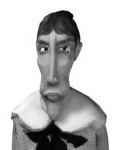 Cast. CB has a decent-sized cast of sketchy, dodgy and/or reprehensible characters, all of them unrepentantly over-the-top.
The voice acting is, um, interesting, particularly when it comes to the very, very Québecois secretary Jeannine. Um, if you're not passingly familiar with the dulcet harmonies of that particular part of Canuckistan, it will just sound as if she smokes three packs a day and is screaming and also voice-acted by a man, but in fact, um... okay, all of this is in fact true. But it's still recognisably a parody of Québecois. Cast. CB has a decent-sized cast of sketchy, dodgy and/or reprehensible characters, all of them unrepentantly over-the-top.
The voice acting is, um, interesting, particularly when it comes to the very, very Québecois secretary Jeannine. Um, if you're not passingly familiar with the dulcet harmonies of that particular part of Canuckistan, it will just sound as if she smokes three packs a day and is screaming and also voice-acted by a man, but in fact, um... okay, all of this is in fact true. But it's still recognisably a parody of Québecois. |
Jacqueline: | Heh. That actually brings up something that was both hilarious and at the same time very, very impressive, to me, at least. I'm pretty sure the whole crew at Absurdus is francophone (and if not, my apologies for the assumption.) Some of the characters have a straight Québecois accent - easy enough. Some are straight anglophone Canadian, and that's harder, but not too much. But then there were these outliers... this guy that I think was supposed to be Irish. Or Scottish. Or, well, I guess it depended on his mood. In all seriousness, it was a pretty damn good accent, even if it strayed across the cultural boundary now and then. I can't even imagine trying to translate a game into French and then do voice acting to distinguish that a particular character is from, oh, Belgium as opposed to Switzerland. So that was really praise-worthy, I thought. Kudos to whoever did the voiceover for the bartender. |
Sam: | The stereotypical characters fit right in with the period tone - awful Greek landlady, bumbling Italian low-end thugs, aloof police detective with a Poirot moustache, vegetarian albino Communist Jew - with the notable glaring absence of anything resembling a femme fatale or hot broad. I'm not sure whether they decided that they couldn't manage to create an attractive character while maintaining the horse-faced caricature style, if their delicate sensibilities were too refined to sink to the level of mere sex humour. Yeah, right: |
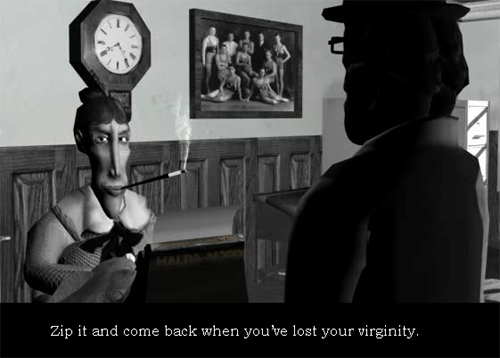
|
Sam: | Quite possibly they just took a look at the general standard of love interests in adventure games and decided that they didn't want any part of it. |
Jacqueline: | Most likely.
And there's never going to be a good segue for this, so as long as we're chatting about chracters, I'd like to point out that the protagonist bears a striking resemblance to Sam the Eagle from The Muppet Show. |
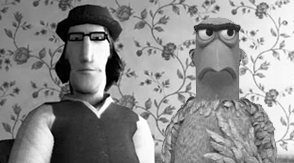
|
Jacqueline: | See??
Okay, carry on. |
Sam: | The main appeal of the game is that it is very, very funny. Most of this is to do with the writing - in particular, the fourth-wall stuff and period-mockery - although there are a few moments where cinematic techniques are essential to the joke. |
Jacqueline: | Let's see... I had something about this in my hastily-scrawled game notes... ah, here it is: lots of hilarious laughter & slapping the desk moments (the aaahahah... ahhhh & the man-witch in partiuclar). Yes, it is a very, very funny game. There were multiple instances of Sam and I laughing so hard that we couldn't speak. |
Sam: | If Pythonesque comedy is not your thing, you may be disappointed; a couple of the funnier scenes are very obviously Python-deriv... er, -inspired. The style of humour does vary enough to avoid eye-rolling, though; in particular, the inventory listings are, well, look: |

|
Jacqueline: | Yeah, the inventory in particular struck me as a beautiful blend of Textual Interactive Fiction Meets Graphic Adventure Interface. Amusing, lovely, and functional. I have mostly nice things to say about interface overall, though I never did quite get the hang of some things and was a little frustrated as a result. Right click brought up something different than I kept thinking it should, for instance, and the save menu was a little tricky and only gave you, like, half a dozen possible save slots, but otherwise it was pretty good. |
Sam: | We also played through the whole game without finding the PC's character sheet because it's called the Resume, no accent, and we thought it meant 'return to game'. |
Jacqueline: | I was impressed overall by the loving touches put into interface. Some for amusement, some merely for the shiny: |
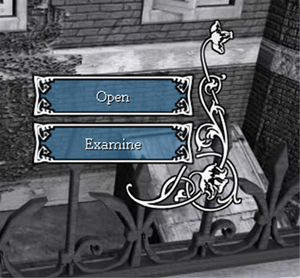
|
Sam: | You know, snarkage is actually fairly difficult where this game is concerned; it's not that it isn't well-supplied with ridiculousness, but the authors are very aware of this and - this is the important bit - make use of it rather than ignoring it and steaming on regardless, or making half-hearted apologetic gags. The fourth-wall stuff seems more as if they're having fun with the game rather than patching up the unfixable. |
Jacqueline: | Yes, and that schtick and the internal monologue were used just enough to be amusing without being over-done. They played their cards perfectly. |
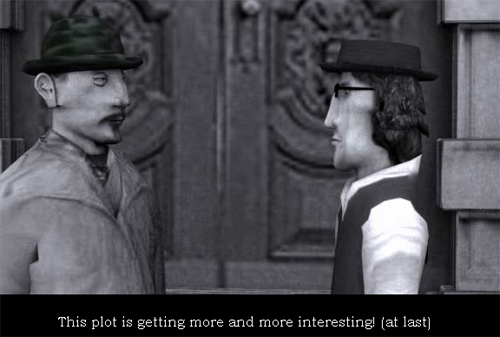
|
Sam: | One thing that struck me at quite a few points was that the period style of caricature often verges on racism - I mean, you have a fat Greek harridan of a widow for a landlady, the Italians are dumb criminals, the Irishman owns the bar, black people are mentioned but not present because they're always in jail...
...but the authors seem to have, well, some grasp of this. The black people are in jail because the police are cracking down on civil rights demonstrators. The game does a fairly good job of depicting the nastier attitudes of the era as objectionable, and of positioning the PC in opposition to them. Mostly. On the one hand, most of the stereotypes are so dated that it's not really possible to read them seriously - but then, I don't know how I'd feel about this if I was a Greek woman, for instance.
Anti-US sentiment, of course, is always acceptable. |
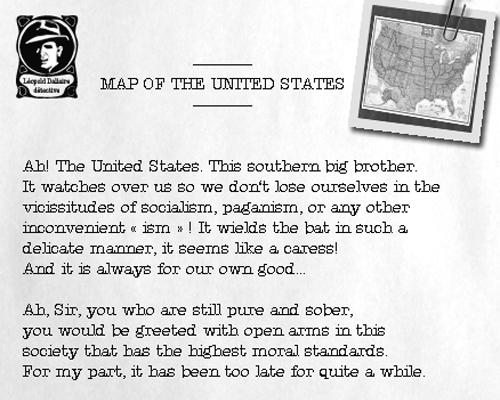
|
Jacqueline: | Let's see... what else? I guess I'd like to talk about how the game went by really quickly. We played this in a single sitting, from mid-afternoon to evening... maybe about six hours? Something like that. Part of the reason it went by so quickly, I think, is that things worked really well, we intuitively knew what to do to get things done, and the puzzles were fairly easy as these things go.
From time to time we would get a little stuck, but then I'd just go back to our office, visit Jeannine's pet iguana, Isaac, and use the 'pet' action. |
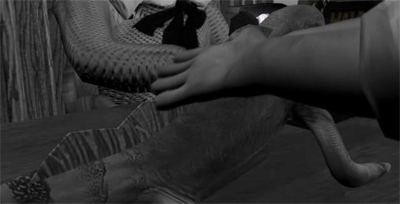
|
Jacqueline: | I think the writers intended this just for fun, and originally I took a screenshot in anticipation of a you like to stroke the lizard as much as the next girl joke, but ultimately, I found petting Isaac strangely soothing and discovered that it helped me sort my thoughts.
It should be pointed out, however, that at one point, Isaac was unable to help us. We lost an object in our inventory which was required to solve a puzzle. I've still no idea how we lost the damn thing, given that there's no inventory limit, you can't actually drop items, and that you spend the entire game carrying around stuff that's been useless since near the beginning of the game. Anyway, we ended up having to backtrack to our most recent (but not really recent) save file (floss regularly, kids) and dig out a walkthrough off the internet to ensure that we didn't make the same mistake twice.
This happened fairly late in the game, and whether it was because we were tired or because we'd already had to give in to temptation to stem our frustration, I'm not sure. But once the flood gates of hintdom had been opened we found ourselves regularly returning to the trough for more. |
Sam: | The main complaint I have about the game is sparseness - when the plot was flowing along smoothly this was less of an issue, but whenever we hit a snag it became apparent that there wasn't very much to do beyond the core actions. Admittedly, this didn't happen all that often, and it tended to come more towards the end of the game, but still... |
Jacqueline: | I think I have a theory on that. This game was years in the making, if memory serves, and its release, when it finally occurred, was long over-due. (Absurdus.net seems to confirm this: "After years of intolerable waiting, Carte Blanche is finally available!") I think there was a certain amount of Let's Just Get This Released Already syndrome. |
Sam: | Oh, yes, certainly it's a lot to ask when you have to do all the writing and coding and testing that an IF author would have to undertake, with animation and voice-acting on top of that, for every damn addition. But still, this could have been a good deal richer, particularly in the later stages when a lot of options have been exhausted. |
Jacqueline: | And so long as I'm thinking about how the release was delayed, I'd like to take this opportunity to thank Gunther once again. Looking at the game's website, the game was first released in the UK, with plans for broader distribution by the beginning of 2007. I'm not sure that really ever happened. Amazon.co.uk claims to sell it for about six quid, but they only have one in stock. There's one copy available on Amazon.com as I type this, available through a third-party seller, for $18. If you're reading this review from North America and think you'd like to play this game (and you most assuredly should play this game), you might want to set any niggling social-consciousness you might have about ordering through Amazon aside and go buy that copy right this second before someone else reading this beats you to the punch.
As for the environmentally-preferable online download, the only place I can seem to find it is through G2 Games for the not-at-all low price of £29.99. That's $44US, $53CAN. Yikes. Sorry, Absurdus. Carte Blanche is awesome, but I'm not sure it's $44 worth of awesome.
Anyway, thank you, Gunther, because if you hadn't sent us this we probably still wouldn't have a copy. How can we repay you? I know... |
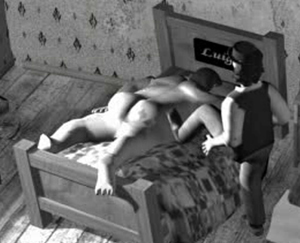
| Sam: | Hel-LO! |
Jacqueline: | I guess that about wraps up this review. Unless you have anything to add, Sam? |
Sam: | Well, I briefly considered turning that last into an animated .gif so that all might marvel at the assfat-wobblage, but I suppose that'll have to remain as an incentive for our readers to hunt down the actual game. |
Jacqueline: | Heh. I can think of better reasons. But yes, everyone should go buy this.
Anyway, I hope you enjoyed our little review. Hopefully it won't be two years until the next one. I would suggest we dive right into one of these other three games Gunther sent us, but first, I think I'd like to act upon a suggestion made by the game. Sam, would you like to take a little trip? Do you know the trip I'm thinking of? |
Sam: | Oh my yes. It's well past 4PM and I have written this entire frickin' review STONE COLD SOBER. |
Jacqueline: | I realize that is a break from the tradition set by our other reviews. But to be fair, we played the game last night, and this was written the morning after. And we would have finished it hours ago if we (probably I) hadn't lost a bunch of it. But yes! The trip in question, as recommended by the game's bartender, is a beer journey, starting in Montreal, going 'round the world, and ending in Belgium. |
Sam: | You realise, of course, that this whole 'I can't start drinking, it's 9AM' attitude is all that's holding us back from a career in videogame jourrnalism, right? |
Jacqueline: | I actually like my day job, thankyouverymuch. |
Sam: | Spoilsport. Okay, we'll just do the abbreviated trip and get Quebec and Belgium in one bottle with a Fin du Monde. |
Jacqueline: | Unibroue's finest! This review's been extremely efficient, I'd say. First we recommend a great game, and then our favorite Belgian ale. Well done! |
[ TOP OF THIS PAGE | MORE REVIEWS | HOME ]


|





 Carte Blanche, December 2006, by Absurdus Games
A mostly spoiler-free review for your enjoyment.
(Because we think you should play this game.)
(Seriously.)
Carte Blanche, December 2006, by Absurdus Games
A mostly spoiler-free review for your enjoyment.
(Because we think you should play this game.)
(Seriously.)




 Cast. CB has a decent-sized cast of sketchy, dodgy and/or reprehensible characters, all of them unrepentantly over-the-top.
The voice acting is, um, interesting, particularly when it comes to the very, very Québecois secretary Jeannine. Um, if you're not passingly familiar with the dulcet harmonies of that particular part of Canuckistan, it will just sound as if she smokes three packs a day and is screaming and also voice-acted by a man, but in fact, um... okay, all of this is in fact true. But it's still recognisably a parody of Québecois.
Cast. CB has a decent-sized cast of sketchy, dodgy and/or reprehensible characters, all of them unrepentantly over-the-top.
The voice acting is, um, interesting, particularly when it comes to the very, very Québecois secretary Jeannine. Um, if you're not passingly familiar with the dulcet harmonies of that particular part of Canuckistan, it will just sound as if she smokes three packs a day and is screaming and also voice-acted by a man, but in fact, um... okay, all of this is in fact true. But it's still recognisably a parody of Québecois.







